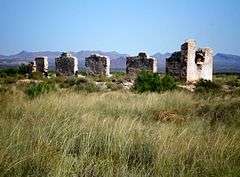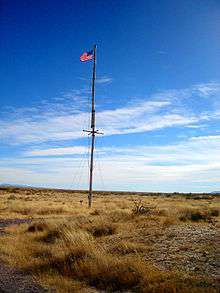Fort Craig
|
Fort Craig | |
 | |
| Location | Socorro County, New Mexico, USA |
|---|---|
| Nearest city | Socorro and Truth or Consequences |
| Built | 1854 |
| Architect | Unknown |
| Website | Fort Craig Historic Site |
| NRHP Reference # | 70000414 [1] |
| Added to NRHP | October 15, 1970 |

Fort Craig was a U.S. Army fort located along El Camino Real de Tierra Adentro, near Elephant Butte Lake State Park and the Rio Grande in Socorro County, New Mexico.
The Fort Craig site was approximately 1,050 feet east-west by 600 feet north-south (320 by 180 m) and was located on 40 acres (16 hectares).
History
Before Fort Craig
The 1848 Treaty of Guadalupe Hidalgo outlined plans for the construction of a series of forts along the new boundaries of Mexico and the United States. Apaches and other Indian groups were reported harassing settlers and travelers on both sides of the border. The attacks by the tribes from inside the United States territory on Mexican soil was something the United States was obligated to prevent under the peace treaty with Mexico. The settlements along the Rio Grande needed protection from Apache and Navajo raids, that required army posts along the Rio Grande Valley.
For that later purpose, in 1849, an initial garrison was established at Socorro, New Mexico. It was then replaced by a fort, Fort Conrad, established along El Camino Real de Tierra Adentro on the west bank of the river, across and a little above the river crossing from Valverde, at the north end of the Jornada del Muerto in 1851.[2]:414 It only operated for a short while. Although it was an ideal location from which to launch military campaigns against the Apache and Navajo, it was beset by construction problems and was under constant threat of flash floods.
Establishment
In 1853 the 3rd U.S. Infantry Regiment began construction of a new fort on a bluff nine miles down river from Fort Conrad.[3]:414 The new fort, named in honor of Captain Louis S. Craig, a popular young officer of the Mexican-American War, was garrisoned in 1854 with troops from Fort Conrad.
Life at remote Fort Craig was uncomfortable and lonely at best and deadly at worst. The buildings were a constant source of misery to the soldiers and records reveal litanies of complaints about leaky roofs, crumbling walls and chimneys, crowded conditions and filth from crumbling dirt roofs and muddy floors.
Civil War
By July 1861, Fort Craig had become the largest fort in the Southwest, with over 2,000 soldiers. That same year, several regiments of New Mexico Volunteers were established to handle the new threat—the Confederate Army of New Mexico.
In September 1861, a cavalry force of about 100 men set out from Fort Craig and skirmished with rebels at Canada Alamosa. This engagement is known as the Battle of Canada Alamosa, one of several small battles to occur in Confederate Arizona.
In February, 1862, all five regiments of New Mexico Volunteers were sent south from Fort Union to reinforce Fort Craig and to wait for the Confederate advance up the Rio Grande.
After capturing several military installations in the newly established Confederate Territory of Arizona, Brigadier General Sibley led his enthusiastic but poorly equipped brigade of about 2,500 Confederate Army of New Mexico. On February 7, 1862, the Army of New Mexico left Fort Fillmore and headed north towards Fort Craig but marched well around the fort after the Union Army refused to do battle on the plain in the front of the fort .[4]
On Fort Craig's massive gravel bastions were mounted "Quaker guns" (fake wooden cannons) with empty soldiers' caps alongside the real cannons and real Union troops. This impressive ruse squelched Sibley's plans for a direct assault on Fort Craig. Furthermore, Sibley did not have the heavy artillery necessary for a siege against the heavily fortified and defended fort.[5]
On February 21, 1862, the Union troops led by Colonel Edward Canby and the Confederate Army of New Mexico of Brigadier General Sibley first met at the Battle of Valverde, a crossing of the Rio Grande just north of the fort. Both sides took heavy casualties. At the end of the day, the Confederates held the field of battle, but the Union still held Fort Craig.
The Battle of Valverde is considered a Confederate victory. However, the New Mexico Volunteers, under the command of Colonel Miguel Pino, found the Confederates' lightly guarded supply wagons and burned them. Sibley was forced to march further north without the supplies he had hoped to take from Fort Craig. On February 23, 1862, the Confederate forces marched around the Union Army and headed for Albuquerque.
Indian Wars
Between 1863 and 1865, Fort Craig was headquarters for U.S. Army campaigns against the Gila and Mimbres Apaches.
Fort Craig was permanently abandoned in 1885.
Fort Craig Historic Site
In 1894, Fort Craig was sold at auction to the only bidder, the Valverde Land and Irrigation Company. Fort Craig was listed on the National Register of Historic Places in 1970.[1] The property was eventually donated to Archaeological Conservancy by the Oppenheimer family and transferred to the Bureau of Land Management in 1981.
In 2008, it emerged that 20 bodies had been looted from the cemetery at Fort Craig, and 67 were exhumed and removed by Federal archaeologists to prevent further looting. The exhumations conducted from August to October removed 67 skeletons—39 men, 2 women and 26 infants and children.[6]
Fort Craig is located 105 miles (170 km) north of Las Cruces, New Mexico and 32 miles (52 km) south of Socorro, New Mexico, between Exits 115 and 124 along Interstate 25. A small visitor center is located at the Fort Craig National Historic Site.
The fictional action taking place in the 1958 Hollywood western genre dramatic film Fort Massacre is set around Fort Crane, a fictional analogue for Fort Craig, in 1879.
References
- 1 2 National Park Service (2007-01-23). "National Register Information System". National Register of Historic Places. National Park Service.
- ↑ STATISTICAL REPORT ON THE SICKNESS AND MORTALITY IN THE ARMY OF THE UNITED STATES, COMPILED FROM THE RECORDS OF THE SURGEON GENERAL’S OFFICE; EMBRACING A PERIOD OF SIXTEEN YEARS, FROM JANUARY, 1839, TO JANUARY, 1855. PREPARED UNDER THE DIRECTION OF BREVET BRIGADIER GENERAL THOMAS LAWSON, Surgeon General of the U. S. Army, by Richard H. Coolidge M. D., Assistant Surgeon, U. S. Army, A. O. P. Nicholson, Printer, Washington, 1856, pp.414-419 Among the Troops in New Mexico
- ↑ STATISTICAL REPORT ON THE SICKNESS AND MORTALITY IN THE ARMY OF THE UNITED STATES, COMPILED FROM THE RECORDS OF THE SURGEON GENERAL’S OFFICE; EMBRACING A PERIOD OF SIXTEEN YEARS, FROM JANUARY, 1839, TO JANUARY, 1855. PREPARED UNDER THE DIRECTION OF BREVET BRIGADIER GENERAL THOMAS LAWSON, Surgeon General of the U. S. Army, by Richard H. Coolidge M. D., Assistant Surgeon, U. S. Army, A. O. P. Nicholson, Printer, Washington, 1856, pp.414-419 Among the Troops in New Mexico
- ↑ Bloody Valverde
- ↑ Bloody Valverde, 1995, John Taylor ISBN 978-0-8263-2148-0
- ↑ Melanie Dabovich (2008-04-08). "67 bodies secretly exhumed from NM grave". Associate Press article. Yahoo. Retrieved 2008-04-08.
- Bloody Valverde,1995, John Taylor ISBN 978-0-8263-2148-0
External links
- Bureau of Land Management Fort Craig site
- Fort Craig, New Mexico
- Fort Tours Fort Craig history page
- FORT CRAIG UNITS, 1854-1884
Coordinates: 33°38′08″N 107°00′51″W / 33.63556°N 107.01417°W